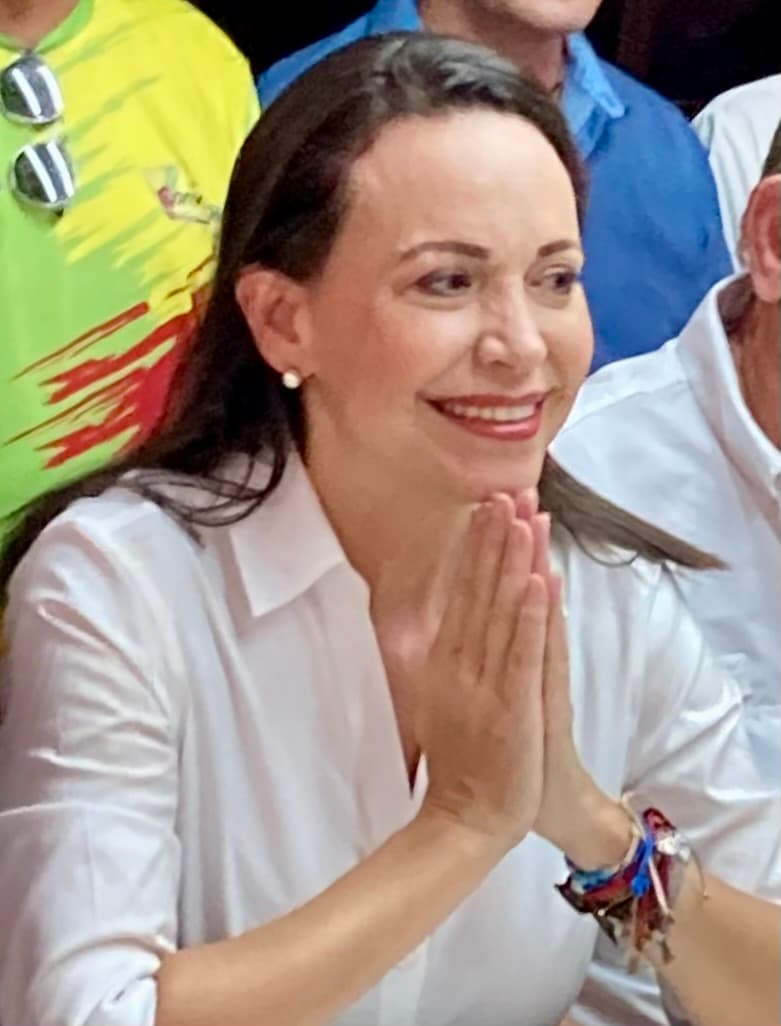SÃO PAULO – The announcement of Venezuelan opposition leader María Corina Machado as the recipient of 2025’s Nobel Peace Prize was received with joy and hope by many Catholics in her native country, who have been quietly celebrating the award in their homes.
The leader of the opposition in Venezuela, Machado was expected to win 2024’s presidential election, but ended up out of the race after the government barred her from running.
Machado threw her support to Edmundo González, who performed convincingly in polls, but President Nicolás Maduro declared own victory and kept his office for a third six-year term.
Machado is still barred from holding any office in Venezuela, and has spent much of the time since the 2024 election in hiding.
There are Catholic among those hopeful the Nobel Prize is a harbinger of change.
“Those are signs of the times,” said Giovanni Luisio Mass, a lay brother who heads the canonical association Order of the Poor Knights of Christ in Venezuela. “We recently learned the date of the canonization of the first Venezuelan saints,” Blessed José Gregório Hernandez and Blessed Carmen Rendiles, Mass noted, who are to be canonized on Oct. 19.
“A number of United States vessels have approached our shore,” Mass also said, “and now the Nobel Prize for Corina Machado. It’s a spiritual battle. Changes will happen.”
Mass told Crux there are large military contingents on the streets in all Venezuelan cities, discouraging public celebration of Machado’s award.
“But one could notice the atmosphere of joy,” Mass told Crux. “As I was walking while wearing my habit, I heard somebody shouting: ‘That’s it, friar! María Corina!”
Mass said people in certain religious and social situations – like a funeral he recently attended – would mention the development.
“They understood that I am someone with whom they could talk about those subjects,” he said.
Venezuela’s bishops have been cautious, but Mass noted how the bishops “recently released a statement concerning José Gregório’s canonization and asked for the liberation of political prisoners.”
On Monday, the Venezuelan government closed its embassy in Oslo, Norway, without giving a reason, mere days after the Norwegian Nobel Committee announced Machado as the recipient of the 2025 Nobel Peace Prize.
For Mass, Machado – who is an observing Catholic – deserved the Nobel for several reasons. She managed to peacefully demonstrate that all Venezuelan elections had been defrauded; she has repeatedly talked about the need to protest peacefully, avoiding more political violence; and she has not left Venezuela after the elections, preferring a risky situation in order to give support to her constituents.
“She gives us a sense of stability and psychological peace,” he said.
There are also many Catholics who support the Maduro regime.
“Our country is polarized and so is the Catholic Church,” Father Geomar Gomez, a vicar in the city of Tigre, told Crux, adding that the Nobel Peace Prize “can be seen as a light at the end of the tunnel, a light of hope and reconciliation.”
The Norwegian Nobel Committee said the award went to Machado in recognition of “her struggle to achieve a just and peaceful transition from dictatorship to democracy,” and praised her courageous decision to stay in Venezuela despite very trying circumstances.
“Despite serious threats against her life,” Committee Chairman Jørgen Watne Frydnes said, “she has remained in the country, a choice that has inspired millions.”
Maduro’s regime accuses Machado of supporting right-wing extremism and collusion with foreign countries in order to destabilize Venezuela.
Machado herself has stated she is a great admirer of Margaret Thatcher, and she has expressed support for the Trump administration’s efforts to staunch the flow of illicit goods and money on which the Venezuelan government relies. “The [Maduro] regime in Venezuela is a criminal structure,” Machado told the BBC, “and as such, they sustain themselves on the criminal flows from their illicit activities.”
“We need the international community to cut those flows that are not only used for corruption, but also for repression, violence and terror,” Machado also told the BBC. “So,” she said, “when you cut the inflows that come from drug trafficking, gold smuggling, arms smuggling, human trafficking, or the black market of oil, then the regime falls — and that’s exactly what we’re seeing, cracks that are getting deeper and deeper as we talk right now.”
In an English-language social media post to the X platform, Machado said, “I dedicate this prize to the suffering people of Venezuela and to President Trump for his decisive support of our cause!”
Since the announcement of the award, Venezuelan clergy members living in Miami and other US cities have been celebrating the news, sending videos and texts about it through messaging apps.
Father Lenin Bastidas, who eight months ago had to leave Venezuela and now lives in Spain, told Crux that “if there’s a person politically coherent in Venezuela, that person is María Corina Machado.”
“Thanks to her struggle and perseverance many of us have kept our hope. She certainly deserves the Peace Nobel. God bless her and Venezuela,” he said.
According to sociologist and theologian Enrique Ali González, professor at the Central University of Venezuela, recent surveys showed that María Corina Machado maintains 70 percent of support among Venezuelans.
“One cannot publicly express joy over the Nobel because the government could retaliate. But if we consider those surveys, we can suppose that a high percentage of the people are happy about the prize,” he told Crux.
Lawyer and opposition activist Tulio Álvarez said most people understand that this prize has “a much longer reach than its mere individual significance.”
“People see it not only as an acknowledgement of Machado’s quality as a leader, but also as a clear sign of imminent change in Venezuela, with direct international support,” he told Crux.















